The global soft start resistor market is valued at USD 321.9 million in 2025 and is set to reach USD 516.4 million by 2035, recording an absolute increase of USD 194.5 million over the forecast period. This translates into a total growth of 60.4%, with the market forecast to expand at a compound annual growth rate (CAGR) of 4.8% between 2025 and 2035. The overall market size is expected to grow by approximately 1.6X during the same period, supported by increasing industrial motor applications, growing demand for power surge protection systems, and rising requirements for energy-efficient starting solutions across manufacturing, material handling, automation, and process control sectors.
The global soft start resistor market represents a critical segment within the electrical equipment and motor control industry, driven by the need to reduce mechanical stress during motor startup and the requirement for controlled current inflow during equipment initialization. These specialized resistors operate through thermal dissipation principles, providing a gradual voltage increase and reliable current limitation for various motor types, including induction motors, synchronous motors, and specialized drive systems. The resistor-based mechanism enables smooth acceleration profiles, making these devices particularly suitable for high-torque applications and systems requiring controlled starting sequences.
The market encompasses various resistance configurations, power ratings, and specialized designs tailored for specific motor control applications. Modern soft start resistors incorporate advanced ceramic materials, improved thermal management systems, and enhanced mounting configurations that can withstand demanding operational environments while maintaining consistent performance over extended duty cycles. The integration of monitoring circuits, thermal protection features, and modular assembly options has further enhanced the value proposition of these resistor systems among industrial users seeking equipment protection and operational reliability.
Market dynamics are influenced by industrial equipment protection requirements, particularly in heavy machinery, material handling, and process automation applications, where sudden mechanical stress and electrical surges can cause premature equipment failure. The manufacturing sector's increasing emphasis on equipment longevity, operational efficiency, and maintenance cost reduction has created substantial demand for high-performance soft start resistor solutions in motor drives, pump systems, and material transport equipment. Additionally, the growing trend toward predictive maintenance and equipment monitoring has amplified the need for resistor systems capable of integration with diagnostic platforms and control networks.
Consumer purchasing patterns show a marked preference for resistor assemblies that combine thermal management capabilities with versatile mounting configurations, multiple resistance values, and comprehensive certification compliance for diverse motor control applications. The market has witnessed technological advancement in ceramic substrate design, wire winding techniques, and thermal dissipation systems, making these devices more suitable for extreme temperature conditions, high-power applications, and electrically demanding environments.
Between 2025 and 2030, the soft start resistor market is projected to expand from USD 321.9 million to USD 406.3 million, resulting in a value increase of USD 84.4 million, which represents 43.4% of the total forecast growth for the decade. This phase of development will be shaped by increasing motor protection adoption, rising demand for energy-efficient starting solutions, and growing availability of advanced ceramic resistor technologies across industrial facilities and motor control applications.
Between 2030 and 2035, the market is forecast to grow from USD 406.3 million to USD 516.4 million, adding another USD 110.1 million, which constitutes 56.6% of the overall ten-year expansion. This period is expected to be characterized by the advancement of integrated monitoring systems, the development of high-power resistor configurations for large-scale motor applications, and the expansion of modular resistor assemblies across diverse industrial and motor control applications. The growing emphasis on equipment protection and operational optimization will drive demand for advanced soft start resistor varieties with enhanced thermal management capabilities, improved power handling characteristics, and superior diagnostic integration performance profiles.
Between 2020 and 2024, the soft start resistor market experienced steady growth, driven by increasing industrial equipment protection investments and growing recognition of resistor-based starting methods' superior performance in reducing mechanical stress following extensive industry adoption campaigns. The market developed as manufacturers recognized the advantages of soft start resistors over direct starting methods in high-inertia applications and began seeking specialized solutions designed for controlled motor acceleration requirements. Technological advancement in ceramic materials and thermal management began emphasizing the critical importance of maintaining power dissipation reliability while enhancing thermal efficiency and improving operational life across diverse motor control applications.
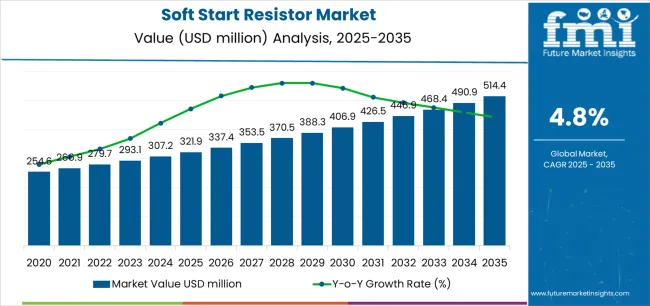
| Metric | Value |
|---|---|
| Estimated Value in (2025E) | USD 321.9 million |
| Forecast Value in (2035F) | USD 516.4 million |
| Forecast CAGR (2025 to 2035) | 4.8% |
From 2030 to 2035, the market is forecast to grow from USD 406.3 million to USD 516.4 million, adding another USD 110.1 million, which constitutes 56.6% of the overall ten-year expansion. This period is expected to be characterized by the advancement of thermal monitoring integration in resistor systems, the integration of condition-based maintenance protocols for optimal equipment scheduling, and the development of specialized resistor configurations for high-power motor applications. The growing emphasis on equipment reliability and maintenance efficiency will drive demand for premium varieties with enhanced thermal dissipation capabilities, improved connectivity options, and superior automated protection characteristics.
Between 2020 and 2024, the soft start resistor market experienced robust growth, driven by increasing awareness of motor protection requirements and growing recognition of specialized resistor systems' effectiveness in supporting reliable motor operations across industrial facilities and equipment control applications. The market developed as users recognized the potential for soft start resistors to deliver operational advantages while meeting modern requirements for controlled motor starting and reliable power dissipation. Technological advancement in thermal management optimization and ceramic material development began emphasizing the critical importance of maintaining thermal efficiency while extending operational life and improving user satisfaction across diverse motor control resistor applications.
Market expansion is being supported by the increasing global emphasis on equipment protection and the corresponding shift toward high-performance motor control systems that can provide superior stress reduction characteristics while meeting user requirements for controlled acceleration and cost-effective maintenance solutions. Modern industrial users are increasingly focused on incorporating resistor systems that can enhance motor reliability while satisfying demands for consistent, controlled starting sequences and optimized equipment lifespan practices. Soft start resistors' proven ability to deliver thermal dissipation excellence, mechanical stress reduction benefits, and diverse application possibilities makes them essential components for equipment-focused manufacturers and reliability-focused industrial professionals.
The growing emphasis on maintenance optimization and industrial equipment protection is driving demand for high-performance soft start resistor systems that can support distinctive operational outcomes and comprehensive motor control management across manufacturing processes, material handling applications, and premium industrial installations. User preference for resistor solutions that combine functional excellence with thermal protection is creating opportunities for innovative implementations in both traditional and emerging motor control applications. The rising influence of condition monitoring technologies and diagnostic systems is also contributing to increased adoption of intelligent resistor solutions that can provide authentic operational benefits and reliable performance monitoring characteristics.
The market is segmented by type, application, power rating, resistance value, and region. By type, the market is divided into metal film resistors, wirewound resistors, carbon film resistors, and other resistor configurations. Based on application, the market is categorized into induction motors, pumps and fans, conveyor belts, HVAC systems, and others. By power rating, the market includes low power, medium power, and high power categories. By resistance value, the market encompasses low resistance, medium resistance, and high resistance configurations. Regionally, the market is divided into North America, Europe, Asia Pacific, Latin America, Middle East & Africa, and other regions.
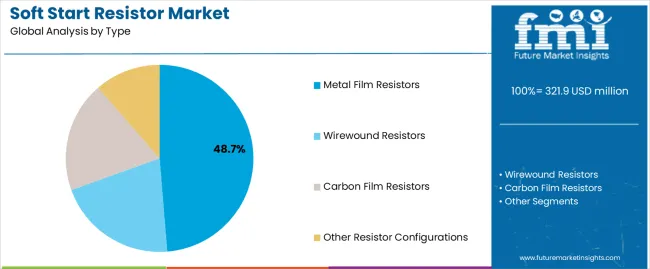
The metal film resistors segment is projected to account for 48.7% of the soft start resistor market in 2025, reaffirming its position as the leading type category. Industrial users and equipment professionals increasingly utilize metal film systems for their superior thermal stability characteristics, established performance standards, and essential functionality in diverse motor starting applications across multiple industrial sectors. Metal film resistors' proven performance characteristics and established cost-effectiveness directly address user requirements for reliable power dissipation and optimal thermal precision in motor control and equipment protection applications.
This type segment forms the foundation of modern motor control performance patterns, as it represents the resistor configuration with the greatest thermal stability and established compatibility across multiple motor control systems. Industrial investments in advanced ceramic technology and thermal optimization continue to strengthen adoption among equipment-focused users. With manufacturers prioritizing operational consistency and thermal reliability, metal film systems align with both efficiency objectives and protection requirements, making them the central component of comprehensive motor starting strategies.
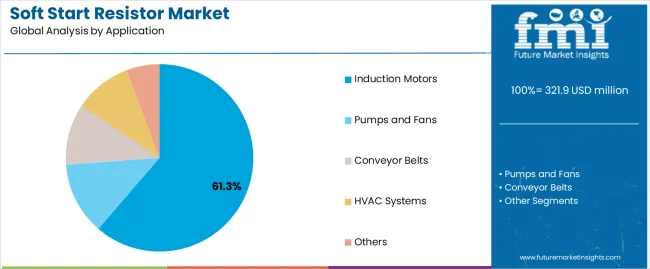
Induction motors is projected to represent 61.3% of the soft start resistor market in 2025, underscoring its critical role as the primary application for equipment-focused users seeking superior motor protection benefits and enhanced operational management credentials. Industrial users and plant operators prefer induction motor applications for their established operational requirements, proven performance demand, and ability to maintain exceptional starting precision while supporting versatile motor coverage during diverse industrial activities. Positioned as essential applications for reliability-focused manufacturers, induction motor offerings provide both operational excellence and equipment protection advantages.
The segment is supported by continuous improvement in motor control technology and the widespread availability of established industrial standards that enable protection assurance and premium positioning at the equipment level. Additionally, industrial users are optimizing resistor selections to support motor-specific applications and comprehensive plant equipment strategies. As motor control technology continues to advance and manufacturers seek efficient protection methods, induction motor applications will continue to drive market growth while supporting equipment reliability and operational optimization strategies.
The soft start resistor market is advancing rapidly due to increasing motor protection adoption and growing need for stress-reduction solutions that emphasize superior thermal dissipation across equipment segments and motor control applications. However, the market faces challenges, including competition from alternative starting technologies, thermal management complexity considerations, and initial investment cost factors affecting adoption rates. Innovation in thermal efficiency enhancement and advanced ceramic materials continues to influence market development and expansion patterns.
The growing adoption of soft start resistors with condition monitoring connectivity and diagnostic system integration is enabling users to develop motor protection strategies that provide distinctive monitoring benefits while commanding automated operation and enhanced real-time thermal analysis characteristics. Equipment diagnostics applications provide superior operational consistency while allowing more sophisticated maintenance optimization features across various industrial categories. Users are increasingly recognizing the operational advantages of intelligent resistor positioning for comprehensive equipment protection outcomes and technology-integrated maintenance management.
Modern soft start resistor manufacturers are incorporating advanced thermal sensors, real-time temperature monitoring capabilities, and thermal protection systems to enhance operational precision, improve equipment protection effectiveness, and meet industrial demands for intelligent motor starting solutions. These systems improve operational effectiveness while enabling new applications, including continuous thermal monitoring programs and automated protection protocols. Advanced thermal integration also allows users to support proactive maintenance positioning and protection assurance beyond traditional resistor operation requirements.
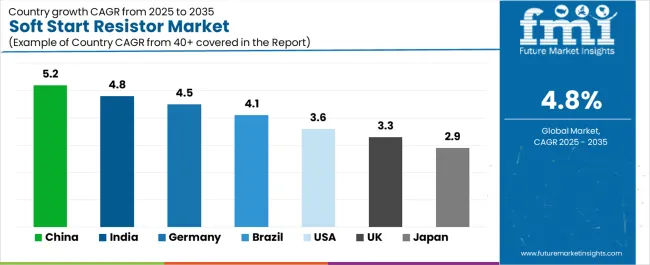
| Country | CAGR (2025 to 2035) |
|---|---|
| China | 5.2% |
| India | 4.8% |
| Germany | 4.5% |
| Brazil | 4.1% |
| USA | 3.6% |
| UK | 3.3% |
| Japan | 2.9% |
The soft start resistor market is experiencing robust growth globally, with China leading at a 5.2% CAGR through 2035, driven by the expanding motor manufacturing sector, growing industrial equipment requirements, and increasing adoption of advanced motor control systems. India follows at 4.8%, supported by rising industrialization, expanding manufacturing industry, and growing acceptance of equipment protection technologies. Germany shows growth at 4.5%, emphasizing established engineering standards and comprehensive motor control development. Brazil records 4.1%, focusing on industrial modernization and equipment efficiency growth. The USA demonstrates 3.6% growth, prioritizing advanced motor control technologies and operational optimization.
The report covers an in-depth analysis of 40+ countries, top-performing countries are highlighted below.
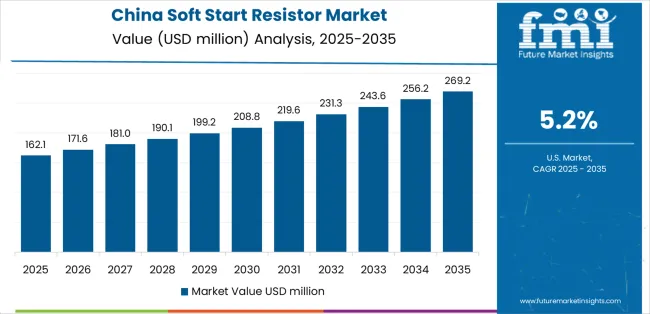
Revenue from soft start resistor consumption and sales in China is projected to exhibit exceptional growth with a CAGR of 5.2% through 2035, driven by the country's rapidly expanding motor manufacturing sector, favorable government policies toward industrial modernization, and initiatives promoting equipment protection technologies across major industrial regions. China's position as a global equipment manufacturing hub and increasing focus on motor control systems are creating substantial demand for high-quality soft start resistors in both domestic and export markets. Major industrial equipment companies and motor control distributors are establishing comprehensive resistor capabilities to serve growing demand and emerging protection opportunities.
Revenue from soft start resistor products in India is expanding at a CAGR of 4.8%, supported by rising industrialization investment, growing equipment consciousness, and expanding motor control distributor capabilities. The country's developing industrial infrastructure and increasing investment in manufacturing technologies are driving demand for soft start resistors across both traditional and modern motor control applications. International equipment companies and domestic distributors are establishing comprehensive operational networks to address growing market demand for motor protection devices and efficient control solutions.
Revenue from soft start resistor products in Germany is projected to grow at a CAGR of 4.5% through 2035, supported by the country's mature engineering standards, established motor control regulations, and leadership in precision equipment technology. Germany's sophisticated industrial standards and strong support for advanced motor control systems are creating steady demand for both traditional and innovative soft start resistor varieties. Leading equipment manufacturers and specialty distributors are establishing comprehensive operational strategies to serve both domestic markets and growing export opportunities.
Revenue from soft start resistor products in Brazil is projected to grow at a CAGR of 4.1% through 2035, driven by the country's emphasis on industrial development, manufacturing modernization growth, and growing equipment distributor capabilities. Brazilian industrial users and manufacturing facilities consistently seek equipment-focused components that enhance operational efficiency and support modernization excellence for both traditional and modern motor control applications. The country's position as a Latin American industrial leader continues to drive innovation in specialized motor protection applications and manufacturing equipment standards.
Revenue from soft start resistor products in the USA is projected to grow at a CAGR of 3.6% through 2035, supported by the country's emphasis on manufacturing technology advancement, motor control optimization, and advanced protection system integration requiring efficient starting solutions. American industrial users and equipment-focused facilities prioritize performance reliability and operational precision, making specialized soft start resistors essential components for both traditional and modern motor control applications. The country's comprehensive manufacturing technology leadership and advancing equipment patterns support continued market expansion.
Revenue from soft start resistor products in the UK is projected to grow at a CAGR of 3.3% through 2035, supported by established industrial standards, mature motor control markets, and emphasis on operational reliability across manufacturing and equipment sectors. British industrial users and equipment professionals prioritize quality performance and operational consistency, creating steady demand for premium resistor solutions. The country's comprehensive market maturity and established industrial practices support continued development in specialized applications.
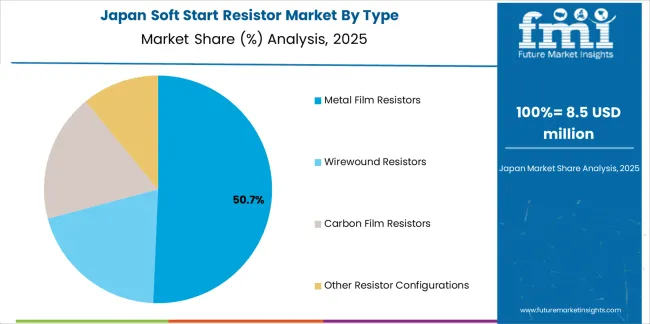
Revenue from soft start resistor products in Japan is projected to grow at a CAGR of 2.9% through 2035, supported by the country's emphasis on precision manufacturing, operational excellence, and advanced technology integration requiring efficient motor starting solutions. Japanese industrial users and equipment-focused facilities prioritize technical performance and manufacturing precision, making specialized soft start resistors essential components for both traditional and modern motor control applications. The country's comprehensive manufacturing leadership and advancing precision patterns support continued market expansion.
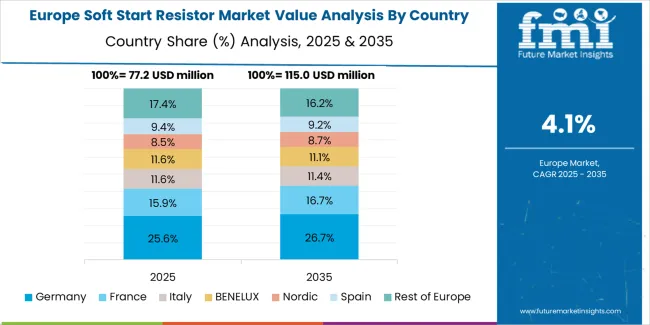
The Europe soft start resistor market is projected to grow from USD 93.7 million in 2025 to USD 141.3 million by 2035, recording a CAGR of 4.2% over the forecast period. Germany leads the region with a 39.8% share in 2025, moderating slightly to 39.2% by 2035, supported by its strong engineering traditions and demand for premium, precision-manufactured resistor solutions. The United Kingdom follows with 18.6% in 2025, easing to 18.1% by 2035, driven by a mature motor control market and emphasis on operational reliability and quality performance. France accounts for 16.2% in 2025, rising to 16.8% by 2035, reflecting steady adoption of motor control technologies and equipment protection. Italy holds 11.7% in 2025, expanding to 12.4% by 2035 as manufacturing modernization and specialty equipment applications grow. Spain contributes 7.4% in 2025, growing to 7.9% by 2035, supported by expanding industrial development and equipment awareness modernization. The Nordic countries rise from 4.1% in 2025 to 4.3% by 2035 on the back of strong engineering consciousness and advanced manufacturing methodologies. BENELUX remains at 2.2% share across both 2025 and 2035, reflecting mature, equipment-focused industrial markets.
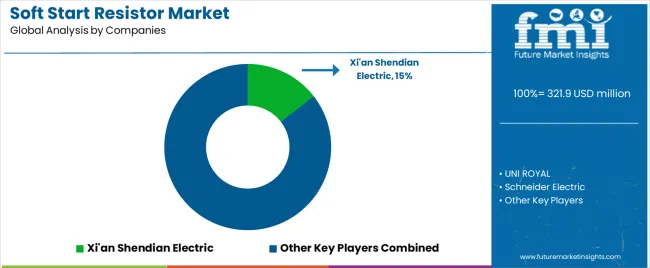
The soft start resistor market is characterized by competition among established electrical equipment manufacturers, specialized resistor companies, and integrated motor control providers. Companies are investing in advanced ceramic technologies, specialized thermal engineering, product innovation capabilities, and comprehensive distribution networks to deliver consistent, high-quality, and reliable soft start resistor systems. Innovation in thermal management optimization, ceramic substrate advancement, and equipment-focused product development is central to strengthening market position and customer satisfaction.
Xi'an Shendian Electric leads the market with a strong focus on resistor technology innovation and comprehensive motor control solutions, offering industrial and equipment systems with emphasis on thermal excellence and engineering heritage. UNI ROYAL provides integrated resistor components with a focus on industrial market applications and precision control networks. Schneider Electric delivers comprehensive motor control solutions with a focus on industrial positioning and operational efficiency. Siemens specializes in comprehensive electrical systems with an emphasis on equipment applications. Eaton focuses on comprehensive industrial protection with advanced design and premium positioning capabilities.
The success of soft start resistors in meeting motor protection demands, equipment efficiency requirements, and operational integration will not only enhance industrial performance outcomes but also strengthen global motor control technology manufacturing capabilities. It will consolidate emerging regions' positions as hubs for efficient resistor production and align advanced economies with comprehensive equipment protection systems. This calls for a concerted effort by all stakeholders - governments, industry bodies, manufacturers, distributors, and investors. Each can be a crucial enabler in preparing the market for its next phase of growth.
| Items | Values |
|---|---|
| Quantitative Units (2025) | USD 321.9 million |
| Type | Metal Film Resistors, Wirewound Resistors, Carbon Film Resistors, Other Resistor Configurations |
| Application | Induction Motors, Pumps and Fans, Conveyor Belts, HVAC Systems, Others |
| Power Rating | Low Power, Medium Power, High Power |
| Resistance Value | Low Resistance, Medium Resistance, High Resistance |
| Regions Covered | North America, Europe, Asia Pacific, Latin America, Middle East & Africa, Other Regions |
| Countries Covered | China, India, Germany, Brazil, United States, United Kingdom, Japan, and 40+ countries |
| Key Companies Profiled | Xi'an Shendian Electric, UNI ROYAL, Schneider Electric, Siemens, Eaton, and other leading soft start resistor companies |
| Additional Attributes | Dollar sales by type, application, power rating, resistance value, and region; regional demand trends, competitive landscape, technological advancements in resistor engineering, thermal optimization initiatives, equipment protection programs, and premium product development strategies |
The global soft start resistor market is estimated to be valued at USD 321.9 million in 2025.
The market size for the soft start resistor market is projected to reach USD 514.4 million by 2035.
The soft start resistor market is expected to grow at a 4.8% CAGR between 2025 and 2035.
The key product types in soft start resistor market are metal film resistors, wirewound resistors, carbon film resistors and other resistor configurations.
In terms of application, induction motors segment to command 61.3% share in the soft start resistor market in 2025.






Full Research Suite comprises of:
Market outlook & trends analysis
Interviews & case studies
Strategic recommendations
Vendor profiles & capabilities analysis
5-year forecasts
8 regions and 60+ country-level data splits
Market segment data splits
12 months of continuous data updates
DELIVERED AS:
PDF EXCEL ONLINE
Soft Touch Lamination Film Market Size and Share Forecast Outlook 2025 to 2035
Software Defined Vehicle Market Size and Share Forecast Outlook 2025 to 2035
Software Defined Networking (SDN) And Network Function Virtualization (NFV) Market Size and Share Forecast Outlook 2025 to 2035
Software Defined Perimeter (SDP) Market Size and Share Forecast Outlook 2025 to 2035
Soft Ferrite Core Market Size and Share Forecast Outlook 2025 to 2035
Soft Gripper Market Size and Share Forecast Outlook 2025 to 2035
Software-Defined Wide Area Network SD-WAN Market Size and Share Forecast Outlook 2025 to 2035
Soft Magnetic Composite Market Analysis - Size, Share, and Forecast Outlook 2025 to 2035
Softwood Veneer and Plywood Market Size and Share Forecast Outlook 2025 to 2035
Software Defined Radio (SDR) Market Size and Share Forecast Outlook 2025 to 2035
Software License Management (SLM) Market Size and Share Forecast Outlook 2025 to 2035
Soft Wall Military Shelter Market Size and Share Forecast Outlook 2025 to 2035
Software-Defined Networking SDN Market Size and Share Forecast Outlook 2025 to 2035
Soft Drinks Packaging Market Size and Share Forecast Outlook 2025 to 2035
Software-Defined Anything (SDx) Market Size and Share Forecast Outlook 2025 to 2035
Software-Defined Data Center Market Size and Share Forecast Outlook 2025 to 2035
Software Containers Market Size and Share Forecast Outlook 2025 to 2035
Software Defined Application And Infrastructure Market Size and Share Forecast Outlook 2025 to 2035
Software Defined Networking Market Size and Share Forecast Outlook 2025 to 2035
Software-Defined Camera (SDC) Market Size and Share Forecast Outlook 2025 to 2035

Thank you!
You will receive an email from our Business Development Manager. Please be sure to check your SPAM/JUNK folder too.
Chat With
MaRIA